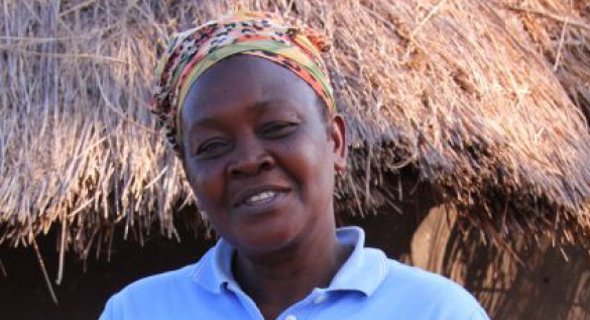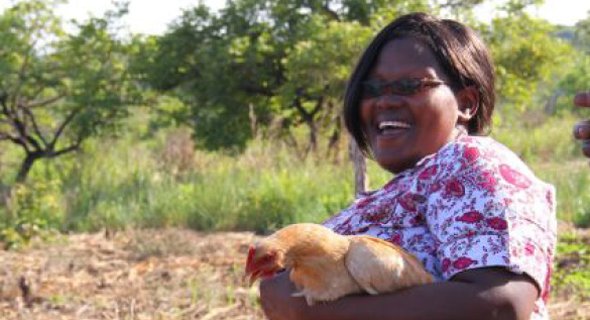This article is part of a series exploring the transformation of African women's lives through education.
From 2000 to 2010, Carnegie Corporation of New York awarded nearly 700 university scholarships to young women in Uganda. Recruiting candidates from the most impoverished and underdeveloped areas of the country proved to be a particular challenge. It was a strange irony that the very women the program targeted were those who found it most difficult to access university education, as factors of civil conflict and poverty, in addition to gender and culture, so often barred the way.
I have come to Uganda to interview women who overcame great odds to secure a scholarship and earn a university degree. Leaving Kampala, I travel north to the town of Gulu to meet Juliet Akello, a scholarship recipient. Gulu was the epicenter of a horrifying civil conflict that lasted more than 20 years. Juliet and her family were among the tens of thousands of people caught up in the terror, as the Lord's Resistance Army staged a violent rebellion against the Ugandan government.
My interview with Juliet begins in the back of a Land Cruiser, as we drive over bumpy dirt roads to reach her family homestead outside of Gulu. Juliet starts to describe the impact the brutal conflict had on her family, on young girls in the area, and on her own childhood. While she recounts these difficult memories, we travel from village to village, asking directions as we go—it has been some time since Juliet visited home, and my questions are distracting.
As we traverse the wounded landscape of northern Uganda, the words of Veronica Ibanda, a psychologist I interviewed who spent a year working near Gulu, echo in my head. I recall her describing the vulnerability, social trauma, and psychic wounds of the people here. The story of the conflict is hard for an outsider to fathom. Briefly, from a toxic legacy of regional underdevelopment emerged a messianic rebel leader, Joseph Kony, a would-be freedom fighter for his Acholi people, whose brutal methods and bizarre doctrines quickly turned his own people against him.
Juliet Akello was the fourth of 10 children in a household of 14 children altogether. Her father had died when she was a child, and her uncle married her mother as per the local custom, absorbing her large family. Money was always very tight, and the conflict made things worse. But Juliet struggled against these difficult odds to get an education.
Schools closed and families, including Juliet's, were herded into camps for internally displaced persons (IDPs). For many children, the conflict destroyed all hope of attending school. Girls already suffered from a cultural bias toward spending a family's limited resources to educate boys rather than girls, a practice that was exacerbated by widespread poverty and conflict.
“One of the major challenges we have here in the north is the issue of the girl child,” says Juliet. “In our families, many times they prefer the male child to the girl child. Because of the poverty here in northern Uganda, the parents send the boys to school first and they leave the girl child at home to do domestic work.”
As she saw her family struggling to pay her academic fees, Juliet resigned herself to dropping out of school. Fortunately, she persisted. Her mother and older brothers sold produce and other small items and always managed to pay her fees. From the camps, she would walk five kilometers each way to school with an army escort. The rebels often kidnapped children on their way to and from school, and would sometimes even attack boarding schools in order to abduct children to serve as soldiers, cooks, and “wives.”
Juliet attended boarding school and recalls one night when rebels attacked the campus. “The rebels came to our apartments while we were sleeping, but the army got there in time, before they got to us,” she says. “But there was a real battle there in the school and so many people died. When we came out in the morning, there were so many dead people.”
After that episode, Juliet continued to ride her bicycle back and forth to school each day, risking abduction. She was never kidnapped nor harmed, but many of her friends and relatives were. “Many were taken to the bush and never returned,” she says. “Many of my relatives had their limbs or ears cut off. Friends were abducted and I never saw them again. Others I ran into years later in the reception center. One of my cousins, they took her when she was nine years old, and she came back with two children. It's not easy for them.”
Eventually Juliet received a scholarship to complete her secondary A-Levels, the qualification necessary to enter Makerere University in Kampala, Uganda’s capital city. Leaving her family behind to endure the constant hunger, hardship, and fear that had become habitual in the north, she struggled to adjust to the calm tranquility of Kampala, where the conflict seemed light years away. “I had bitter feelings,” she says. “I felt: why in my home is there so much suffering? The city was full of life. You are in class every day undisturbed. You study with peace of mind. There are no gunshots, no bodies, nobody coming to arrest you.”
After high school, Juliet had no idea how she would pay for university, but she enrolled at Makerere anyhow. It was her older brother, also in the capital, who found out about CCNY’s Female Scholarship Initiative and brought her an application form. She was awarded the scholarship and majored in secretarial studies. “I was the first one from all my clan to graduate from university,” she says. “The chance I got was so important for me and my family.”
When she graduated in 2007, peace was returning to Gulu. She wanted to contribute to her family's recovery and the reconstruction of her community. She found work (initially as an unpaid intern) at the Institute of Peace and Strategic Studies at the University of Gulu, and helped her family to leave the IDP camp and resettle on their 15-hectare property. She later got a full-time job at the Institute and also got married. Since then, she has paid university fees for three of her brothers, the youngest of whom is currently finishing his social science degree at Gulu University.
Juliet recounts this poignant story as we continue to make our way to her family compound. Finally, we arrive, and her mother and uncle come out to meet us. In the background, two of her sisters, with the help of a couple of local women, are shelling recently harvested groundnuts. Juliet's mother, Santa Atim, and her uncle, Okan John Azira, welcome us to their home. They are happy to tell me about the many ways in which Juliet has assisted the family. When they returned to their land, she helped them financially with reviving the farm, and also advised them on ways of making it more profitable.
One side of the compound is lined with shea trees, which produce shea butter. On the gentle slopes below the living area, the family is now cultivating bananas, as Juliet had suggested they do. They are also growing groundnuts and vegetables, and raising chickens for sale in town. These enterprises are keeping the family afloat financially, and also provide seasonal employment for some of the neighbors. Eleven out of the 14 siblings, including Juliet, have now been educated, and Juliet is also helping educate her sisters' children.
Because of her example, the family now takes a different view toward educating girls. “We used to allow our boys to go (to school) first, but now we think there should be equal opportunity,” her uncle explains. “Without her, we would be helpless.” Juliet's mother is clearly very proud of her daughter. "She was raised in line with loving people," she says. As we prepare to leave, she wants to give me one of her chickens as a token of her gratitude for the university scholarship and all it has done for her family.
Indeed, it would be hard to overestimate the importance of well-educated and philanthropic individuals like Juliet in these types of communities. Now that peace has arrived in northern Uganda, there is a huge need for teachers, businesspeople, and other experts who can rebuild the economy, yet there is a dire shortage of people with the right skills. For many, long years spent in the refugee camps have diminished their drive to farm or conduct business. The cycle of poverty continues as many struggle to return to school.
When it comes to education, boys are still given preference over girls. “To me this is not good, because everyone should be given opportunity to study,” says Juliet. She and her husband, a farmer, now support a number of boys and girls, some of whom are orphans, who returned from the bush to attend school. The couple pays their fees and provides mentorship. “I like talking with the girls,” says Juliet. “They have some self esteem and feel they are part of society. They say, ‘Auntie Julie has done it.’ I feel proud because I am their role model.”











